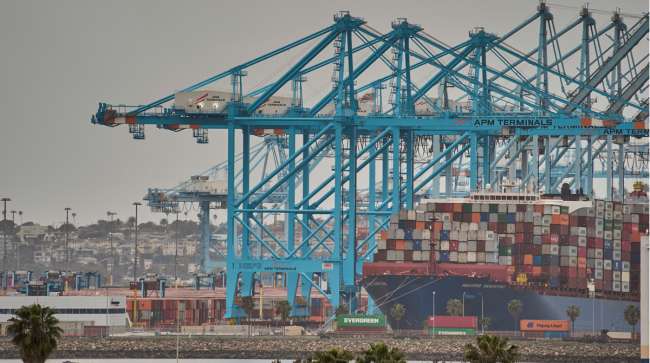China remains Southern California’s largest trading partner, with roughly $130 billion in imports passing through the ports of Los Angeles and Long Beach last year. (Damian Dovarganes/Associated Press)
President Donald Trump’s tariffs on Chinese imports threaten to disrupt Southern California’s trade and logistics economy, a sector that moves a third of the nation’s container cargo and supports nearly 2 million jobs, according to a new analysis.
Trump’s 145% tariff on Chinese imports is expected to dramatically reduce volumes through the ports of Los Angeles and Long Beach, the nation’s busiest container gateway, according to a report by the Southern California Leadership Council and the Los Angeles County Economic Development Corp. China’s 125% retaliatory duties on U.S. goods are likely to drag down outbound traffic.
“That’s going to hurt the people who unload the cargo when it lands in our ports, the longshoremen, the people who ship it on rail or truck to the warehouses, the people who store it in warehouses and send it on to its final destination,” said SCLC co-chair and former California Gov. Gray Davis in a press conference on April 22.
China remains Southern California’s largest trading partner, with roughly $130 billion in imports passing through the twin ports last year, according to the report. Los Angeles port officials expect cargo volumes to fall by at least 10% as early as May, with declines likely to continue through the end of the year.
Together, the ports handle roughly 35% of all U.S. containerized cargo and anchor a vast logistics network that stretches through the Inland Empire.
The region is home to major distribution centers, rail systems and trucking routes used by Amazon, Walmart, FedEx, UPS and Prologis, a real estate giant specializing in warehouses. Trade and transportation directly employs more than 900,000 workers in Southern California and indirectly supports nearly 2 million jobs.
Amazon ranks No. 1 on the Transport Topics Top 100 list of the largest logistics companies in North America, and No. 1 on the Top 50 list of the largest global freight carriers.
UPS and FedEx rank Nos. 1 and 2, respectively, on TT’s Top 100 list of the largest for-hire carriers in North America, and Nos. 5 and 43 on the logistics TT100. On the global freight TT50, FedEx ranks No. 2 and UPS No. 3.
Walmart ranks No. 1 on TT’s Top 100 list of the largest private carriers in North America.
The tariffs tit-for-tat also leaves thousands of the region’s importers facing inputs that potentially are two-and-a-half times more expensive, forcing companies to absorb the price increases or pass them on to consumers, the report said.
Some economists say the impact of the tariffs may be less severe than anticipated.
Jerry Nickelsburg, director of the UCLA Anderson Forecast, said in the report that there’s no evidence to show that previous increases in tariffs have impacted port- and logistics-related employment.
Nickelsburg also noted that geopolitical instability in the Middle East and low water levels in the Panama Canal have diverted more shipping traffic to California, offering a temporary boost.
The report’s release comes as California Gov. Gavin Newsom sues the Trump administration, arguing the tariffs the White House have imposed exceed presidential authority and disproportionately harm states like California, which would have the world’s fifth-biggest economy if it was a standalone country.
Newsom has pledged to negotiate directly with foreign officials to seek exemptions from counter-tariffs and help shield key industries, though U.S. states lack the authority to negotiate international agreements.






